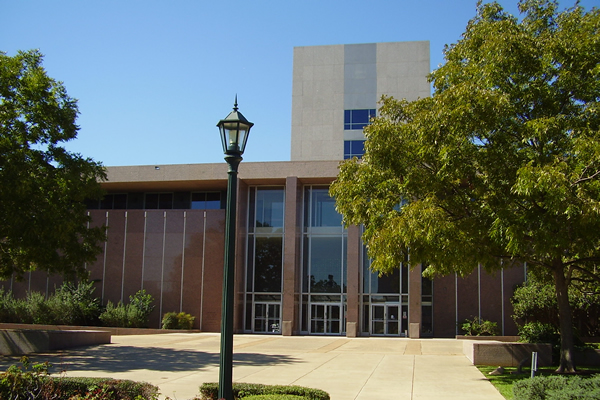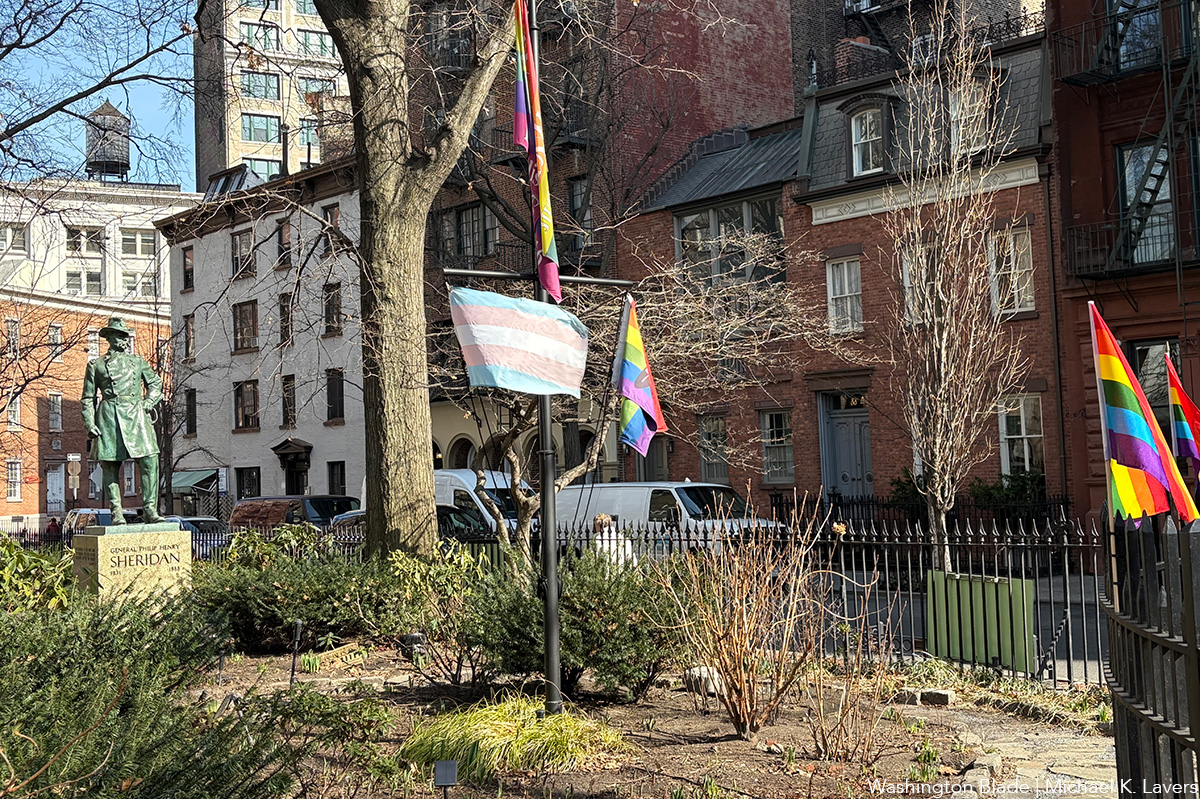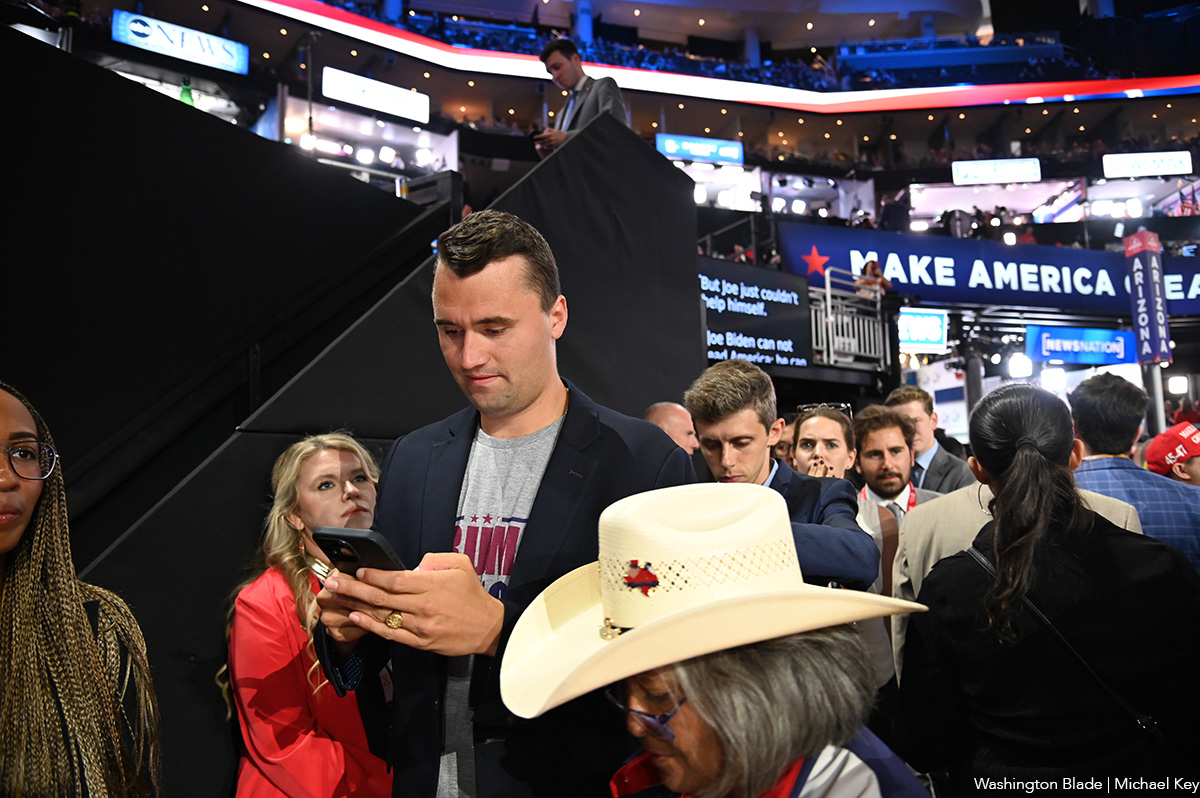National
Texas Supreme Court rules against benefits for same-sex couples
Says state workers have no right to obtain benefits for gay spouses


Supreme Court of Texas has ruled no established right exists for extending benefits to same-sex couples. (Photo public domain)
Despite the U.S. Supreme Court extending marriage equality nationwide — and a recent declaration from justices affirming that decision — the Texas Supreme Court on Friday ruled against spousal benefits for married same-sex couples.
Writing for the court, Justice Jeffrey Boyd determined the 2015 decision in Obergefell v. Hodges “is not the end” on the same-sex marriage issue and state workers have no established right to obtain benefits, such as health insurance, for their same-sex spouses in the same way as other employees.
“The Supreme Court held in Obergefell that the Constitution requires states to license and recognize same-sex marriages to the same extent that they license and recognize opposite-sex marriages, but it did not hold that states must provide the same publicly funded benefits to all married persons, and — unlike the Fifth Circuit in De Leon — it did not hold that the Texas DOMAs are unconstitutional,” Boyd writes.
The 24-page ruling instructs a trial court — which had determined prior to the Obergefell ruling the state need not afford benefits to married same-sex couples — to re-examine the issue under the guidance that the DeLeon decision, a federal case that overturned the Texas same-sex marriage ban, doesn’t bind the court.
“We hold that the Fifth Circuit’s decision in De Leon does not bind the trial court on remand, and the trial court is not required to conduct its proceedings ‘consistent with’ that case,” Boyd writes.
Further, the Texas Supreme Court reverses the judgment of the Texas 14th Court of Appeals that overturned the trial court’s decision.
The case was filed by Jack Pidgeon and Larry Hicks after former Houston Mayor Annise Parker, a lesbian, instructed her city to provide spousal benefits to city employees in same-sex marriages after the Supreme Court’s 2013 ruling against the anti-gay Defense of Marriage Act. Jack Pidgeon and Larry Hicks contended state law, which at the time barred same-sex marriage, prevented Parker from taking that action.
The Texas Supreme Court decision seems to fall short of outright denying spousal benefits for married same-sex couples and instead remands the case to a trial court for reconsideration of the issue. The Texas Supreme Court also vacates the trial court’s decision barring Houston from granting spousal benefits.
The court’s ruling comes in the same week the U.S. Supreme Court issued a ruling in Pavan v. Smith affirming marriage equality nationwide, overturning an Arkansas Supreme Court decision upholding a state law against placing both lesbian parents’ names on the birth certificates of their children.
Boyd writes the Pavan decision demonstrates “the Supreme Court has taken one opportunity to address Obergefell’s impact on an issue it did not address in Obergefell, and there will undoubtedly be others.”
That’s incorrect. The U.S. Supreme Court took up the case only after the Arkansas Supreme Court issued the ruling contrary to to the Obergefell decision. The U.S. Supreme Court also said Obergefell explicitly addressed the birth certificate issue, citing plaintiffs who were seeking to place their names on their children’s birth certificates. The Obergefell ruling, the U.S. Supreme Court concluded, guarantees same-sex couples the constellation of benefits under marriage.
Boyd also notes the U.S. Supreme Court elected to take up the Masterpiece Cakeshop case, which involves a bakery refusing to make a wedding cake for a same-sex couple. But that review will address whether the First Amendment grants the right for businesses to refuse services to same-sex couples, not whether the government can deny same-sex benefits.
Kenneth Upton Jr., senior counsel in Lambda Legal’s Dallas-based South Central Regional Office, said the Texas Supreme Court decision is similarly contrary to the principles of the Obergefell ruling.
“This absurd contortion of the Obergefell ruling defies all logic and reason, especially in light of the Supreme Court’s explicit ruling on Monday that marriage is marriage and equal is equal,” Upton said. “We will take steps to protect these families.”
Eric Lesh, fair courts project director at Lambda Legal, said the ruling from the Texas Supreme Court — which is made up of justices who are elected rather than appointed — demonstrates a judiciary made up of elected justices is inadequate.
“This decision is political and is an example of why elected judges are bad for LGBT people and bad for judicial independence,” Lesh said.
Also condemning the Texas Supreme Court was GLAAD CEO Sarah Kate Ellis, who said the ruling demonstrates marriage equality isn’t safe.
“The Texas Supreme Court’s decision this morning is a warning shot to all LGBTQ Americans that the war on marriage equality is ever-evolving, and anti-LGBTQ activists will do anything possible to discriminate against our families,” Ellis said. “In the age of the Trump administration, which continues to systematically erase LGBTQ Americans from the fabric of this nation, the LGBTQ community and our allies must remain visible and push back harder than ever against attacks on acceptance.”
The White House
Trump-Vance administration ‘has dismantled’ US foreign policy infrastructure
Current White House took office on Jan. 20, 2025

Jessica Stern, the former special U.S. envoy for the promotion of LGBTQ and intersex rights, on the eve of the first anniversary of the Trump-Vance administration said its foreign policy has “hurt people” around the world.
“The changes that they are making will take a long time to overturn and recover from,” she said on Jan. 14 during a virtual press conference the Alliance for Diplomacy and Justice, a group she co-founded, co-organized.
Amnesty International USA National Director of Government Relations and Advocacy Amanda Klasing, Human Rights Watch Deputy Washington Director Nicole Widdersheim, Human Rights First President Uzra Zeya, PEN America’s Jonathan Friedman, and Center for Reproductive Rights Senior Federal Policy Council Liz McCaman Taylor also participated in the press conference.
The Trump-Vance administration took office on Jan. 20, 2025.
The White House proceeded to dismantle the U.S. Agency for International Development, which funded LGBTQ and intersex rights organizations around the world.

Secretary of State Marco Rubio last March announced the State Department would administer the 17 percent of USAID contracts that had not been cancelled. Rubio issued a waiver that allowed PEPFAR and other “life-saving humanitarian assistance” programs to continue to operate during the U.S. foreign aid freeze the White House announced shortly after it took office.
The global LGBTQ and intersex rights movement has lost more than an estimated $50 million in funding because of the cuts. The Washington Blade has previously reported PEPFAR-funded programs in Kenya and other African countries have been forced to suspend services and even shut down.
Stern noted the State Department “has dismantled key parts of foreign policy infrastructure that enabled the United States to support democracy and human rights abroad” and its Bureau of Democracy, Human Rights, and Labor “has effectively been dismantled.” She also pointed out her former position and others — the Special Representative for Racial Equity and Justice, the Ambassador-at-Large for Global Women’s Issues, and the Ambassador-at-Large for Global Criminal Justice — “have all been eliminated.”
President Donald Trump on Jan. 7 issued a memorandum that said the U.S. will withdraw from the U.N. Entity for Gender Equality and the Empowerment of Women and more than 60 other U.N. and international entities.
Rubio in a Jan. 10 Substack post said UN Women failed “to define what a woman is.”
“At a time when we desperately need to support women — all women — this is yet another example of the weaponization of transgender people by the Trump administration,” said Stern.
US ‘conducting enforced disappearances’
The Jan. 14 press conference took place a week after a U.S. Immigration and Customs Enforcement agent killed Renee Good, a 37-year-old woman who left behind her wife and three children, in Minneapolis. American forces on Jan. 3 seized now former Venezuelan President Nicolás Maduro and his wife, Cilia Flores, at their home in Caracas, the Venezuelan capital, during an overnight operation. Trump also continues to insist the U.S. needs to gain control of Greenland.

Widdersheim during the press conference noted the Trump-Vance administration last March sent 252 Venezuelans to El Salvador’s Terrorism Confinement Center, a maximum-security prison known by the Spanish acronym CECOT.
One of them, Andry Hernández Romero, is a gay asylum seeker who the White House claimed was a member of Tren de Aragua, a Venezuelan gang the Trump-Vance administration has designated as an “international terrorist organization.” Hernández upon his return to Venezuela last July said he suffered physical, sexual, and psychological abuse while at CECOT.
“In 2025 … the United States is conducting enforced disappearances,” said Widdersheim.
Zeya, who was Under Secretary of State for Civilian Security, Democracy, and Human Rights from 2021-2025, in response to the Blade’s question during the press conference said her group and other advocacy organizations have “got to keep doubling down in defense of the rule of law, to hold this administration to account.”
The White House
A full year of Trump and LGBTQ rights: all that’s been lost
White House since Inauguration Day has relentlessly attacked LGBTQ community

Uncloseted Media published this story on Jan. 20.
By NICO DiALESANDRO | One year ago today, Donald Trump was inaugurated as president of the United States for the second time. Since then, he and his administration have waged an all-out attack on the LGBTQ community by slashing crucial health and support programs, pressuring states to exclude transgender people from most aspects of life and erasing information about the community’s history. Here are all the biggest moves Trump has made against LGBTQ rights over the last 365 days.
Jan. 20, 2025 – Trump’s second first day
During his inaugural address, Trump says, “As of today, it will henceforth be the official policy of the United States government that there are only two genders: male and female.” Later that day, Trump signs “Defending Women from Gender Ideology Extremism and Restoring Biological Truth to the Federal Government,” an executive order that defines “sex” in federal law to mean biological sex at conception. It also eliminates federal recognition of trans identities, blocks gender self-identification on federal documents, ceases federal funding for gender-affirming care and restricts trans people’s access to bathrooms, prisons, shelters, and other government facilities that match their gender identity.
Trump also signs “Ending Radical and Wasteful Government DEI Programs and Preferencing,” an executive order that orders federal agencies to terminate diversity, equity and inclusion mandates, policies and programs. This order repeals a policy put in place by the Biden administration that created initiatives for the federal government to combat systemic barriers related to hiring on the basis of race, religion, income, gender identity, sexual orientation, and disability.
“We’re the party of common sense, you know, we don’t want to have men playing in women’s sports. We don’t want to have transgender operations for everyone,” Trump says at the Liberty Ball party that evening. Trump would go on to repeat the sentiment countless times throughout the year, including at press conferences with world leaders, in an interview with “60 Minutes” and even while deploying the National Guard in Washington.
Jan. 21, 2025 – The flurry of executive orders continues
Trump signs “Ending Illegal Discrimination and Restoring Merit-Based Opportunity,” another executive order that revokes a 1965 order which mandated affirmative action for federal contractors and required that they take steps to comply with nondiscrimination laws. The order violates the U.S. Supreme Court’s 2020 decision in Bostock v. Clayton County, which extended Title VII sex-based protections to trans people.
Nearly all LGBTQ- and HIV-focused content and resources are deleted from the White House’s website including the White House’s equity report, information about LGBTQ Pride Month and a fact sheet on expanding access to HIV prevention and treatment. In addition, the State Department removes its LGBTQ rights page, and the Department of Labor removes its LGBTQ workers page.
Jan. 28, 2025 – funding cuts
Trump signs “Protecting Children from Chemical and Surgical Mutilation,” an executive order that bars federal funding for gender-affirming care for minors and directs the Department of Health and Human Services to restrict insurance coverage for such treatments under Medicare, Medicaid and the Affordable Care Act. Hours after Trump signs the order, Uncloseted Media speaks with six LGBTQ kids to get their thoughts.
“For me, it’s definitely very frightening. Especially because right now I’m 16, and so, I’m going to become an adult over the course of his presidency. … And it’s really difficult, especially to plan for the future and have that lack of surety that I thought that I would,” Crow, who lives in Virginia, told Uncloseted Media.
Feb. 3, 2025
Mentions of LGBTQ people are erased or minimized across federal government websites, with a particular focus on trans and intersex people. The State Department first removes trans people in its travel safety guidelines, only mentioning the “LGB” community. As of publication, the web page has no mention of bisexual travelers either.
Feb. 5, 2025
Trump signs “Keeping Men Out of Women’s Sports,” an executive order that prohibits trans women and girls from competing on collegiate female sports teams.
Feb. 13, 2025
Under the direction of Trump’s executive order, the National Park Service removes references to trans and queer rights and history, including from the Stonewall National Monument pages. The “TQ” from “LGBTQ” is dropped in instances where the acronym is present. Protesters gather at the Stonewall National Monument in New York the next day to voice their outrage.
In an interview with Uncloseted Media, Stacy Lentz, co-owner of the Stonewall Inn, calls the removal a blatant attempt to rewrite history and exclude the very people who led the fight for equality.

Feb. 14, 2025
The U.S. withdraws from the United Nations LGBTI Core Group, which formed in 2008 and pledges to support LGBTQ and intersex rights by “work[ing] within the United Nations framework on ensuring universal respect for the human rights and fundamental freedoms for all, specifically lesbian, gay bisexual, transgender and intersex (LGBTI) persons, with a particular focus on protection from violence and discrimination.”
March 15, 2025 – illegal deportations
The Trump-Vance administration deports 238 Venezuelan migrants to CECOT, a maximum-security prison in El Salvador. The administration claims these individuals are affiliated with the Tren de Aragua gang. Andry Hernández Romero, a gay makeup artist seeking asylum, is one of the migrants with no criminal record. Hernández vanished from U.S. custody before his asylum hearing, and his lawyer asserts he was deported without due process.

On July 18, Hernández is returned to Venezuela along with 249 other migrants. The Department of Homeland Security dismisses abuse allegations of torture, sexual assault and other inhumane treatment.
April 2, 2025
U.S. Citizenship and Immigration Services updates its policy to recognize only two biological sexes, male and female, for immigration benefit requests and official documentation. This policy shift reverses previous efforts to accommodate nonbinary and trans individuals, as it removes the “X” gender marker option from immigration forms.
“By denying trans people the right to self-select their gender, the government is making it harder for them to exist safely and with dignity. This is not about ‘common sense’ — it is about erasing an entire community from the legal landscape,” says Bridget Crawford, director of law and policy at Immigration Equality.
April 3, 2025
In his first few months in office, Trump and his administration cancel over 270 National Institutes of Health grants focused on LGBTQ health, totaling at least $125 million in unspent funds. The cancellations disrupt research on HIV testing and prevention, AIDS, cancer, mental health and more.
The cuts scrap more than $800 million worth of research into the health of LGBTQ people. The cuts abandon studies of cancers and viruses and set back efforts to defeat a resurgence of sexually transmitted infections. They also eliminate swaths of medical research on diseases that disproportionately afflict LGBTQ people, including HIV/AIDs, various sexually transmitted infections and cancers.
June 2, 2025
Stanford begins suspending gender-affirming care for people younger than 19 in response to Trump’s executive order. Other major health networks and many regional centers across the country begin following suit.
Children’s Hospital Los Angeles announces they will be cutting off care for patients as old as 25 beginning in July, stating that they were left with “no viable alternative” because they could not risk any cuts to their federal funding.
June 6, 2025
Trump’s military ban begins, disallowing trans people from serving in all branches of the armed forces and removing those currently in the service. Those who do not identify themselves will have their medical records surveyed and be involuntarily separated if it is discovered that they are trans.
July 1, 2025
Trump’s “Big Beautiful Bill” is passed by Congress. The sweeping package of tax breaks that largely benefit the wealthy include major funding cuts to LGBTQ health care as well as a number of support programs that disproportionately serve queer people.
July 17, 2025
The Trump-Vance administration officially shuts down the LGBTQ-specific option on the 988 youth suicide hotline. This comes a year after data finds that 41 percent of LGBTQ youth seriously considered suicide. Notably, there are no plans to shut down the other targeted hotline options. Arden, who called when they were 16, told Uncloseted Media, “If it weren’t for the hotline, I would have killed myself.”
Aug. 4, 2025
U.S. Immigration and Customs Enforcement arrests 40-year-old asylum seeker Rickardo Anthony Kelly during a routine immigration appointment. Kelly, who survived being shot 10 times in Jamaica by attackers who targeted him for being gay, is released two weeks later and describes the conditions of the ICE facility as “unconscionable,” “inhumane,” and “horrific.”
Aug. 12, 2025
The State Department releases a revised 2024 human rights report that omits references to LGBTQ people and erases mentions of discrimination based on sexual orientation or gender identity. The report also removes critiques of governments for mistreating LGBTQ communities.
It excludes information about Hungary’s anti-LGBTQ laws that encourage citizens to report their LGBTQ neighbors and that ban depictions of homosexuality or gender transition in schools or the media.
Aug. 15, 2025
The Trump-Vance administration announces plans to eliminate gender-affirming care from the Federal Employees Health Benefits Program starting in 2026. The policy would also block access to hormones and surgeries for federal workers and their families.
Aug. 20, 2025
The media reports on court filings that reveal that the Justice Department issued subpoenas to hospitals for private medical records of LGBTQ patients 18 and younger. The DOJ requests billing data, communication with drug manufacturers, Social Security numbers and recordings from providers who treat gender nonconforming minors. Doctors across the country report threats and fear government retaliation.
“The subpoena is a breathtakingly invasive government overreach. … It’s specifically and strategically designed to intimidate health care providers and health care institutions into abandoning their patients,” says Jennifer L. Levi, senior director of transgender and queer rights at GLAD law, an LGBTQ legal group and civil rights organization.
Sept. 4, 2025
In response to a mass shooting in Minneapolis that was carried out by a trans woman, CNN reports that the DOJ is considering restricting trans Americans’ Second Amendment rights. The department aims to justify a firearm ban by declaring trans people mentally “defective,” building off of Trump’s trans military ban. The proposal sparks backlash from the National Rifle Association, who says in a statement that they will not “support … gun bans that arbitrarily strip law-abiding citizens of their Second Amendment rights.”
Sept. 12, 2025
The DOJ removes a study from its website showing that far-right extremists have killed more Americans than any other domestic terrorist group. The archived report disappears two days after anti-LGBTQ conservative activist Charlie Kirk is assassinated.

Sept. 22, 2025
White House Press Secretary Karoline Leavitt claims the administration is investigating why trans people are turning to “domestic terrorism,” despite no evidence of this. She calls anyone denying the false link “willfully ignorant,” despite the most recent data available from 2018 showing that trans people are four times more likely to be victims of violent crime when compared to cisgender people.
Sept. 23, 2025
Trump cancels a budget meeting and blames a potential government shutdown on Democrats’ support for trans-inclusive policies.
Oct. 1, 2025
FBI Director Kash Patel fires a trainee for displaying a Pride flag on his desk, labeling it an improper “political” message. The dismissal follows reports that pro-Trump appointees are combing internal FBI files to identify LGBTQ employees.
Oct. 3, 2025
Education Secretary Linda McMahon sends a nine-page proposal to nine universities that asks for a commitment to ban trans-inclusive facilities, define sex by “reproductive function” and limit race, gender or identity factors in admissions. The proposal calls for schools to revise their governance structures by “abolishing institutional units that purposefully punish, belittle, and even spark violence against conservative ideas.”
Oct. 10, 2025
The White House lays off more than 1,100 HHS employees. The Office of Population Affairs, which administered Title X family-planning networks, teen pregnancy prevention and LGBTQ health initiatives, is eliminated.
Nov. 6, 2025
The Supreme Court grants the Trump-Vance administration’s request to put a hold on federal rulings in Massachusetts, affecting trans and nonbinary people by preventing them from self-identifying correctly on their IDs, claiming to be in line with Trump’s “Defending Women from Gender Ideology Extremism and Restoring Biological Truth to the Federal Government” executive order. In her dissent, Justice Ketanji Brown Jackson writes, “This court has once again paved the way for the immediate infliction of injury without adequate (or, really, any) justification. Because I cannot acquiesce to this pointless but painful perversion of our equitable discretion, I respectfully dissent.”
Dec. 4, 2025
According to a memo obtained by NPR, the DOJ instructs inspectors to stop evaluating prisons and jails using standards designed to protect trans, intersex, and gender nonconforming people from sexual violence. This is in direct violation of the Prison Rape Elimination Act.
Dec. 18, 2025
HHS Secretary Robert F. Kennedy Jr. and Mehmet Oz, who leads Medicaid and Medicare, announce that HHS is heavily restricting trans health care; prohibiting Medicaid reimbursement for gender-affirming care for people under 18; and blocking all Medicare and Medicaid funding for hospitals that provide the care to minors.
Jan. 1, 2026
The Office of Personnel Management institutes policy changes that exclude coverage for “chemical and surgical” gender-affirming care in the FEHB and Postal Service Health Benefits plans for 2026, with narrow exceptions.
Jan. 7, 2026
Renee Good is shot and killed by ICE agent Jonathan Ross in Minneapolis. Good leaves behind a wife, Becca, and three children. In a statement, Becca remembers her wife:
“Renee lived by an overarching belief: there is kindness in the world and we need to do everything we can to find it where it resides and nurture it where it needs to grow. Renee was a Christian who knew that all religions teach the same essential truth: we are here to love each other, care for each other, and keep each other safe and whole.”

Days later, Trump tells reporters, “At a very minimum, that woman was very, very disrespectful to law enforcement. … It was highly disrespectful of law enforcement. The woman and her friend were highly disrespectful of law enforcement.”
Additional reporting by Hope Pisoni. Washington Blade photos by Michael Key and Michael K. Lavers.
Florida
DNC slams White House for slashing Fla. AIDS funding
State will have to cut medications for more than 16,000 people

The Trump-Vance administration and congressional Republicans’ “Big Beautiful Bill” could strip more than 10,000 Floridians of life-saving HIV medication.
The Florida Department of Health announced there would be large cuts to the AIDS Drug Assistance Program in the Sunshine State. The program switched from covering those making up to 400 percent of the Federal Poverty Level, which was anyone making $62,600 or less, in 2025, to only covering those making up to 130 percent of the FPL, or $20,345 a year in 2026.
Cuts to the AIDS Drug Assistance Program, which provides medication to low-income people living with HIV/AIDS, will prevent a dramatic $120 million funding shortfall as a result of the Big Beautiful Bill according to the Florida Department of Health.
The International Association of Providers of AIDS Care and Florida Surgeon General Joseph Ladapo warned that the situation could easily become a “crisis” without changing the current funding setup.
“It is a serious issue,” Ladapo told the Tampa Bay Times. “It’s a really, really serious issue.”
The Florida Department of Health currently has a “UPDATES TO ADAP” warning on the state’s AIDS Drug Assistance Program webpage, recommending Floridians who once relied on tax credits and subsidies to pay for their costly HIV/AIDS medication to find other avenues to get the crucial medications — including through linking addresses of Florida Association of Community Health Centers and listing Florida Non-Profit HIV/AIDS Organizations rather than have the government pay for it.
HIV disproportionately impacts low income people, people of color, and LGBTQ people
The Tampa Bay Times first published this story on Thursday, which began gaining attention in the Sunshine State, eventually leading the Democratic Party to, once again, condemn the Big Beautiful Bill pushed by congressional republicans.
“Cruelty is a feature and not a bug of the Trump administration. In the latest attack on the LGBTQ+ community, Donald Trump and Florida Republicans are ripping away life-saving HIV medication from over 10,000 Floridians because they refuse to extend enhanced ACA tax credits,” Democratic National Committee spokesperson Albert Fujii told the Washington Blade. “While Donald Trump and his allies continue to make clear that they don’t give a damn about millions of Americans and our community, Democrats will keep fighting to protect health care for LGBTQ+ Americans across the country.”
More than 4.7 million people in Florida receive health insurance through the federal marketplace, according to KKF, an independent source for health policy research and polling. That is the largest amount of people in any state to be receiving federal health care — despite it only being the third most populous state.
Florida also has one of the largest shares of people who use the AIDS Drug Assistance Program who are on the federal marketplace: about 31 percent as of 2023, according to the Tampa Bay Times.
“I can’t understand why there’s been no transparency,” David Poole also told the Times, who oversaw Florida’s AIDS program from 1993 to 2005. “There is something seriously wrong.”
The National Alliance of State and Territorial AIDS Directors estimates that more than 16,000 people will lose coverage


















